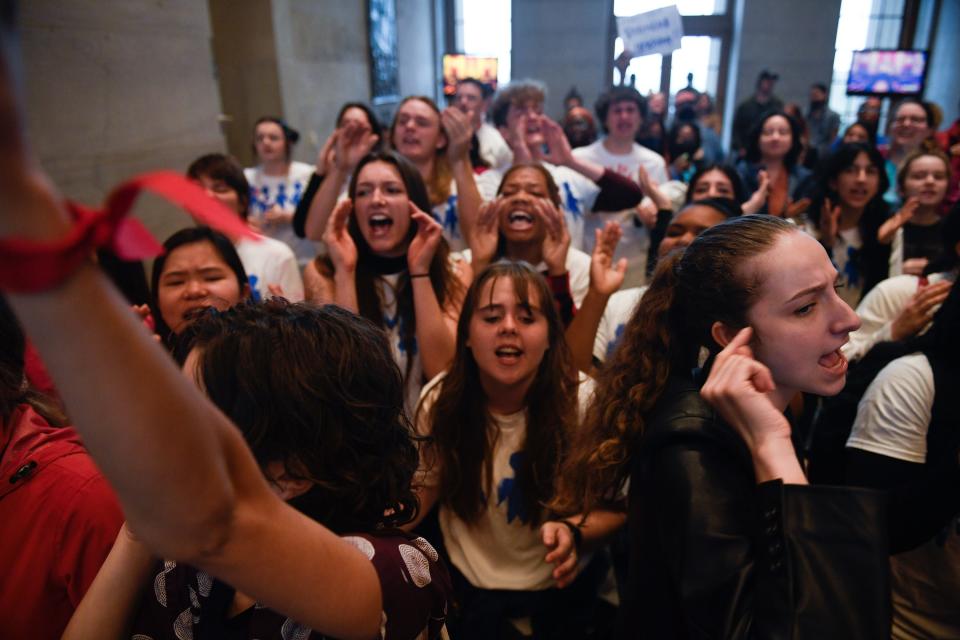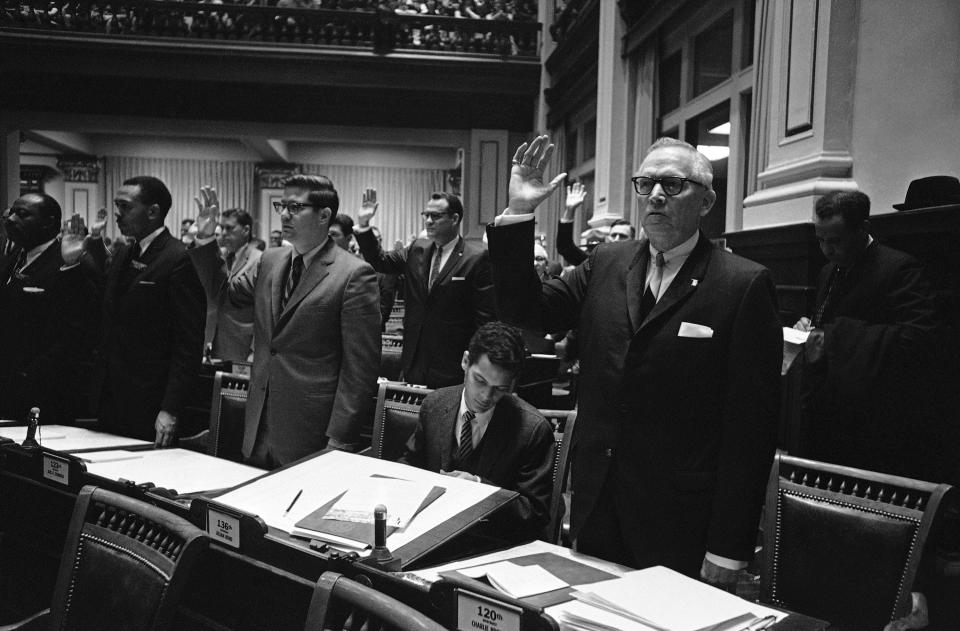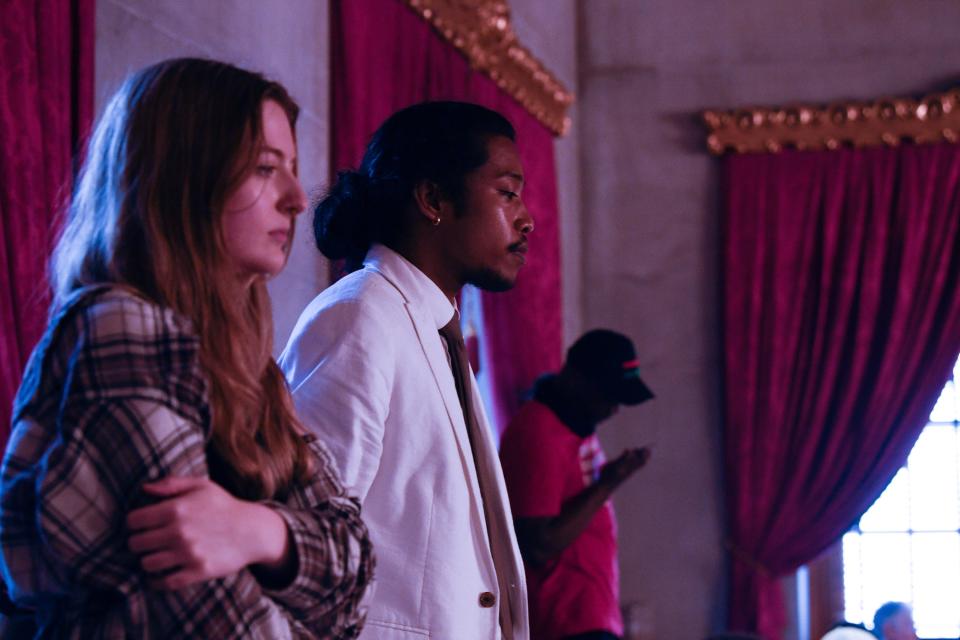A ‘symbolic attack’: How the First Amendment was front and center during expulsion debate
- Oops!Something went wrong.Please try again later.
- Oops!Something went wrong.Please try again later.
- Oops!Something went wrong.Please try again later.
In the midst of the demonstrations at the state Capitol, hundreds of protesters packed into the confines of the old building, creating walls of shoulders and walls of sound as they chanted their support for the three Democratic lawmakers facing expulsion that day.
The ceiling rattled with chants and the floor shook with the stomping as the crowd — undulating like an oversized snake — coiled and hissed with each vote broadcasted on the TV monitors.
The overwhelming turnout on April 6 was just one snapshot of the demonstrations following The Covenant Shooting and subsequent expulsion of two Democratic lawmakers that placed the First Amendment — in all its power, complexity and even limitations — on full display for the nation to see.

Following the mass shooting at The Covenant School, demonstrations against gun violence sprang up across the state, but most prominently in Nashville. Reps. Justin Jones, D-Nashville, Justin Pearson, D-Memphis and Gloria Johnson, D-Knoxville, led their own protests on the House floor, breaking the chamber's rules to speak in support of stricter gun control measures during a House session on March 30.
The politics of expulsion: How Republicans handed Democrats a major win with historic vote
The pushback on the three Democrats came swiftly: a historic expulsion vote left Jones and Pearson ousted from their seats and Johnson left standing by merely one vote.
“It’s a great First Amendment argument,” said Aftyn Behn, a local activist and demonstrator, wiping rain from her drawn hood as she stood with demonstrators outside the Capitol. “We have three democratically elected officials who used their First Amendment rights on the floor, supporting others using their First Amendment rights, and yet they’re being expelled. It’s not right.”
Although Jones and Pearson have been reinstated via interim appointments, Tennessee Republicans received national criticism for the expulsion, along with mounting questions regarding the First Amendment rights of the lawmakers and whether they were violated by the GOP’s retaliation.
'At least symbolically, this was an assault on First Amendment,' expert says
Before his expulsion, Pearson sent a letter to his House colleagues, explaining he was using his First Amendment rights to help "elevate the voices in our community who want to see us act to prevent gun violence."
"We must always stand up for what we believe to be right and just, we must say no to more gun violence," he wrote.
Related: A week after expulsion, Justin Pearson of Memphis returns to Tennessee House
Related: Justin Jones returns to state legislature after unanimous Nashville Council appointment
But the First Amendment rights of a lawmaker speaking inside the legislature is more complex, legal experts say.
David Hudson, a Belmont University law professor and First Amendment expert, said a key case to study is a U.S. Supreme Court decision from 1966.
“Bond v. Floyd is an extraordinary case that sets strong First Amendment precedent for legislators, even from 57 years ago,” Hudson said.
Julian Bond’s case holds similarities to today’s case of the Tennessee Three, as they've become known. Bond, a young, Black, newly elected representative in the Georgia House of Representatives, was blocked from taking his elected seat from the majority-white body following statements made on a hot political issue—in his case, his opposition to the Vietnam War.

The case went all the way to the U.S. Supreme Court, which ruled in Bond’s favor and the action against him a violation of his First Amendment rights — as well as those of his constituents.
“The manifest function of the First Amendment in a representative government requires that legislators be given the widest latitude to express their views on issues of policy,” wrote Chief Justice Earl Warren, who issued the court’s opinion on the case. “The central commitment of the First Amendment … is that ‘debate on public issues should be uninhibited, robust, and wide-open.’ Just as erroneous statements must be protected to give freedom of expression the breathing space it needs to survive, so statements criticizing public policy and the implementation of it must be similarly protected."
“Legislators have an obligation to take positions on controversial political questions so that their constituents can be fully informed by them, and be better able to assess their qualifications for office,” Warren added. “Also so they may be represented in governmental debates by the person they have elected to represent them.”
But a key difference between Bond’s case and the Tennessee Three is the timing of their statements. Bond’s comments were made in a news interview outside the House chambers. Jones and Pearson broke House rules to use a bullhorn to lead the gallery in chants for gun control, resulting in a recess in legislative business.
“The facts are different, but the larger principle is you cannot remove someone from a state legislature because of their political viewpoints,” Hudson said. “The GOP could try to claim that they (removed Jones and Pearson) because of the disruption. And that argument may succeed. But still, you're still doing the same thing. So I do think while Bond v. Floyd is not exactly on point for this case, there is a strong precedent that argues that the Tennessee leaders in the House overstepped their authority…. I think that at least symbolically, this was an assault on First Amendment.”
Lawmakers can face limits on speech
Kevin Goldberg, a First Amendment specialist at the Freedom Forum, said the difference between the two cases is vital to deciding if the expulsion is a historic violation of the First Amendment rights of the lawmakers, the GOP enforcing the House rules on decorum and order or an overly harsh punishment.
‘You hung us out to dry’: Leaked audio shows hot tempers inside GOP caucus after expulsion vote
“Constitutional rights trump anything else,” he said. “You can pass all the rules you want but if they attack the First Amendment, the First Amendment wins, even for legislators. But does that mean they can say and do every everything they want, whenever they want? No.”
Goldberg said there are many instances where a lawmaker's right to freely speak can be limited, regardless of Bond v. Floyd and especially considering the venue in which they are speaking.

“The first limitation would be whether these three are considered ‘public employees,’” Goldberg said. “Because there's a concept called ‘public employee speech’ that says when you're acting as a public employee, your First Amendment rights are limited because of your association with the government — because it might be perceived that you're talking for the government.”But Goldberg said that this legal standard — determined by the court case Garcetti v. Ceballos in 2006 — is unlikely to be used by the state of Tennessee as the reason to limit the legislators’ speech, considering one of the main arguable exceptions to this rule is the idea of protesting something that’s a matter of “public concern” — matters like mass shootings.
Another limitation that Goldberg said could apply to the lawmakers’ right to speak is rather simple: whether they were engaged in “unprotected areas of speech,” like inciting violence.
“If they engaged in unprotected areas speech, then their rights fall away entirely,” Goldberg said. “We're talking about incitement to imminent, lawless action. We're talking about fighting words. We're talking about true threats against other members of the legislature. I don’t see any argument that can be made that (they did this).”
Finally, Goldberg said where the speech took place is also applicable. Whether it is in a “non-public” or “public forums” can determine free speech limitations, he said.
“The Capitol floor, called the well, is what we would probably call a non-public forum,” he said. “It's an area owned by the government that has not traditionally been open to free speech for all.”
Non-public forums, defined by Perry Education Association v. Perry Local Educators’ Association in 1983, are areas that “the state may reserve…for its intended purposes, communicative or otherwise, as long as the regulation on speech is reasonable and not an effort to suppress expression merely because public officials oppose the speaker’s view.”
This rule, Goldberg said, puts the argument right back where it started — the state can claim that the space is non-public, where they have a right to limit the legislator’s free speech in the interest of decorum. But the ruling, and subsequent punishments, have to be applied evenly — which is where Goldberg said he believes the state runs afoul.
“I think the argument on the side of the legislators will be that the application of these restrictions, in the form of expulsion and censure, is applied in an overbroad way,” he said. “What we're talking about here is viewpoint discrimination: you've treated these three on this side of the issue differently than you might have treated people who might be against gun control.”
In essence, Goldberg said the state may have an arguable right to limit expression of free speech on the floor — but the First Amendment violation comes not in the limitation itself, but in the consistency of punishment for violations of these limitations.
“I think that that going from zero to 60, so to speak, and kicking two members out is what we would call overbroad,” Goldberg said. “There's a whole lot of actions that can, and probably should have been, taken in the middle. And frankly, a whole lot of actions that would probably have been applied to others, and historically have been applied to others, and not applied in this case. So these three could not have predicted they would have gotten in trouble for engaging in a First Amendment-based action. That’s a defense in itself.”
One thing that was not up for debate, however, was the overwhelming display of the First Amendment from the thousands of demonstrators that rallied at the Capitol over the past few weeks.
“It's just great that so many people come out and use nonviolent protest, and the right of assembly, to try to affect change on an issue,” Goldberg said. “It was multigenerational, and I love seeing kids protest. It’s why we do this work: that the freedom for each generation continues, that this tradition we've had in the country of love of assembly of speech, and of petition…all five rights that came squarely into play here.”
The USA Today Network - Tennessee's coverage of First Amendment issues is funded through a collaboration between the Freedom Forum and Journalism Funding Partners.
Have a story to tell? Reach Angele Latham by email at alatham@gannett.com, by phone at 731-343-5212, or follow her on Twitter at @angele_latham
This article originally appeared on Nashville Tennessean: Tennessee three: The First Amendment was front and center during expulsion

